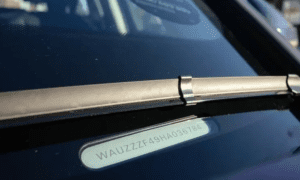In the small city of Bad Dürkheim, nestled in the picturesque Palatinate region of Germany, an unexpected revolution is brewing. At the helm of this revolution is Lars Stevenson, a man whose life story reads like a modern-day odyssey; a tale of eclectic pursuits that have led him from exporting wine to disrupting the European electric vehicle (EV) market. Stevenson’s venture, Elaris, is not just another car manufacturer; it’s the embodiment of a bold vision to bring affordable, high-performance electric mobility to Europe. Leveraging China’s cutting-edge technology, Elaris has emerged as a formidable player in the increasingly competitive EV industry, setting new benchmarks in innovation and accessibility.
A Background Like No Other
Lars Stevenson is no ordinary entrepreneur. Born into a multicultural family with roots stretching from Germany to Malaysia and China, Stevenson’s life has been anything but conventional. His father, a renowned human geneticist from Malaysia, imparted to him a deep appreciation for science and innovation. Growing up, Stevenson was drawn to fields as diverse as astronomy, quantum physics, and software development. By the age of fourteen, he was already programming software; a passion that would later lead him to establish two successful AI companies, one of which earned him the prestigious German Innovation Award.
Despite his early success in technology, Stevenson’s career took a turn towards the more traditional industry of wine exportation. His extensive network of relatives in China facilitated his entry into the Chinese market, where he became one of the largest exporters of Palatinate wine. But even as his wine business flourished, Stevenson’s entrepreneurial spirit remained restless. His diverse experiences from opening a tarte flambée restaurant in Beijing to brokering oil deals in Jordan hinted at a broader ambition: to make a lasting impact on the global stage.
The Birth of Elaris: A Vision Realized
The seeds of Elaris were sown at the intersection of Stevenson’s multifaceted interests and his unwavering commitment to innovation. The turning point came during the height of the global climate debate, when the urgency of transitioning to sustainable energy became impossible to ignore. For Stevenson, the challenge was clear: to create an electric vehicle that was not only technologically advanced but also affordable for the average consumer.
In partnership with a former Porsche manager, Stevenson embarked on a journey to China, where he secured contracts with leading Chinese automakers to produce vehicles according to his specifications. The idea was simple yet revolutionary; take advantage of China’s advanced manufacturing capabilities and combine them with German engineering precision to create a new breed of electric cars tailored for the European market.

The Elaris Lineup: Innovation Meets Affordability
Elaris has quickly established itself as a brand synonymous with innovation, quality, and affordability. The company’s current lineup includes four distinct models: the compact Dyo, the SUV Beo, the saloon Jaco, and the versatile Lenn. Each model is designed with the European consumer in mind, featuring modifications and customizations that cater to local tastes and regulatory requirements.
The cars are produced by contract manufacturers in China, namely Dorcen, Skywell, and GAC; who are among the most respected names in the industry, though relatively unknown in Europe. The vehicles are assembled using a modular approach, where high-quality components are sourced from various suppliers: batteries from industry giants BYD and CATL, interior fittings from the Bavarian company Koller, and cutting-edge software developed in-house by Elaris.
What sets Elaris apart from many of its competitors is its commitment to data privacy. The company has developed its own software platform, based on Android, which is fully GDPR-compliant. This ensures that all vehicle data is stored securely in Germany, giving Elaris a unique selling point in a market increasingly concerned with data security and privacy.
Navigating Challenges: From Setbacks to Success
Elaris’ journey has not been without its challenges. One of the most significant setbacks occurred during an early partnership with Lidl, the German discount retailer. Elaris had planned to market its Dyo model (formerly known as the Elaris Finn) through Lidl’s car rental platform, Like2Drive, at a highly competitive monthly lease rate of 222 euros. However, the deal fell through at the last minute due to a trademark dispute over the name “Finn.” This forced Elaris to rebrand and delay its launch, a costly setback for the fledgling company.
Despite this, Stevenson and his team remained undeterred. They shifted their focus to a more traditional sales strategy, building relationships with car dealerships across Germany. This move proved to be a masterstroke. Car dealerships, particularly those aligned with Volkswagen, were eager to partner with Elaris, drawn by the higher profit margins offered by the company compared to traditional automakers. Elaris’ ability to deliver vehicles quickly, thanks to its streamlined production and delivery processes, further strengthened its appeal to dealers.
As a result, Elaris now boasts a network of over 200 dealerships across Europe, with plans to expand to 350 by the end of the year. This rapid growth underscores the high demand for Elaris vehicles and the effectiveness of the company’s go-to-market strategy.
Elaris’ Market Strategy: Combining Traditional and Modern Approaches
Elaris’ success is not solely due to its innovative products but also to its savvy marketing and distribution strategies. Recognizing the importance of brand visibility, the company has engaged in a series of targeted marketing campaigns designed to resonate with a broad audience.
One such campaign involved a partnership with Clemens Brock, a popular social media influencer known as the “beer fluencer.” Brock’s endorsement helped to raise awareness of the Elaris brand among younger, tech-savvy consumers. In addition, Elaris secured a sponsorship deal with the Bundesliga football club Union Berlin, further enhancing its visibility among sports fans.
Looking ahead, Elaris plans to leverage its partnership with the Automobile Club of Germany (AvD) to reach a wider audience. The company is developing a marketing campaign specifically targeting AvD members, highlighting the benefits of Elaris vehicles in terms of both performance and affordability.

The Future of Elaris: Scaling New Heights
As Elaris continues to grow, the company’s ambitions show no signs of slowing down. To support this growth, Elaris is in the process of securing additional financing, with negotiations currently underway for a new round of investment.
One of the most significant milestones in Elaris’ journey came with the company’s listing on the Munich stock exchange. Although the IPO was postponed due to market volatility, Elaris is well-positioned to capitalize on favorable conditions when they arise. The company’s current valuation, estimated at just under 500 million euros, reflects the strong potential that investors see in Elaris’ business model and market strategy.
Conclusion: A Visionary’s Legacy
Lars Stevenson’s journey from wine exporter to electric car manufacturer is a testament to the power of vision, determination, and adaptability. In a relatively short period, he has transformed Elaris from a bold idea into a reality, challenging established players in the automotive industry and pushing the boundaries of what is possible in the world of electromobility.
Elaris’ success is not just a personal triumph for Stevenson; it represents a significant step forward in the broader transition to sustainable energy. By offering affordable, high-quality electric vehicles, Elaris is making electric mobility accessible to a wider audience, helping to drive the adoption of clean energy technologies across Europe.
As Elaris continues to innovate and expand, the company is poised to play a leading role in the future of the automotive industry. With its unique blend of German engineering, Chinese manufacturing prowess, and a deep commitment to customer satisfaction, Elaris is well on its way to becoming a household name in Europe and beyond.
In the years to come, Elaris will undoubtedly face new challenges and opportunities as it navigates the complex landscape of the global EV market. But with Lars Stevenson at the helm, there is little doubt that the company will continue to chart a course for success, leaving a lasting legacy in the world of electric vehicles.
For more information on Elaris and its latest developments, you can visit their official website. Additionally, you can read more about their innovative software platform and their listing on the Munich stock exchange through their press releases and official announcements.



































